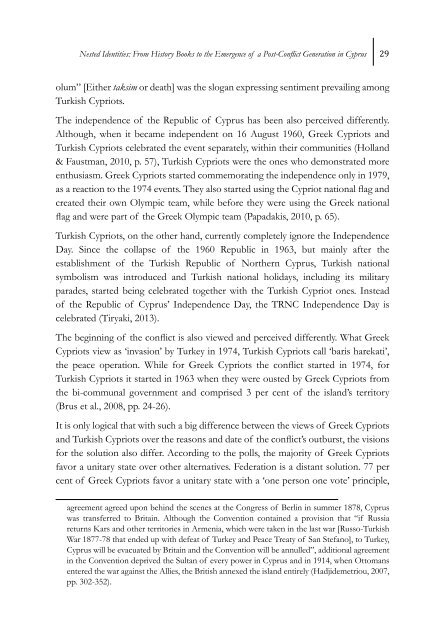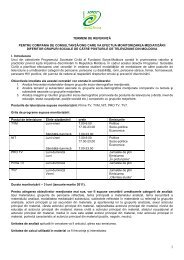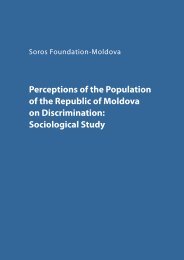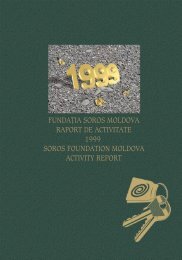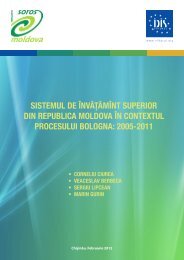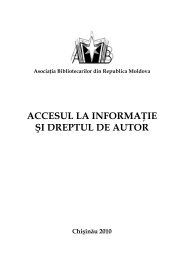Managing Intractable Conflicts: Lessons from Moldova and Cyprus
Managing Intractable Conflicts: Lessons from Moldova and Cyprus
Managing Intractable Conflicts: Lessons from Moldova and Cyprus
You also want an ePaper? Increase the reach of your titles
YUMPU automatically turns print PDFs into web optimized ePapers that Google loves.
Nested Identities: From History Books to the Emergence of a Post-Conflict Generation in <strong>Cyprus</strong><br />
29<br />
olum” [Either taksim or death] was the slogan expressing sentiment prevailing among<br />
Turkish Cypriots.<br />
The independence of the Republic of <strong>Cyprus</strong> has been also perceived differently.<br />
Although, when it became independent on 16 August 1960, Greek Cypriots <strong>and</strong><br />
Turkish Cypriots celebrated the event separately, within their communities (Holl<strong>and</strong><br />
& Faustman, 2010, p. 57), Turkish Cypriots were the ones who demonstrated more<br />
enthusiasm. Greek Cypriots started commemorating the independence only in 1979,<br />
as a reaction to the 1974 events. They also started using the Cypriot national flag <strong>and</strong><br />
created their own Olympic team, while before they were using the Greek national<br />
flag <strong>and</strong> were part of the Greek Olympic team (Papadakis, 2010, p. 65).<br />
Turkish Cypriots, on the other h<strong>and</strong>, currently completely ignore the Independence<br />
Day. Since the collapse of the 1960 Republic in 1963, but mainly after the<br />
establishment of the Turkish Republic of Northern <strong>Cyprus</strong>, Turkish national<br />
symbolism was introduced <strong>and</strong> Turkish national holidays, including its military<br />
parades, started being celebrated together with the Turkish Cypriot ones. Instead<br />
of the Republic of <strong>Cyprus</strong>’ Independence Day, the TRNC Independence Day is<br />
celebrated (Tiryaki, 2013).<br />
The beginning of the conflict is also viewed <strong>and</strong> perceived differently. What Greek<br />
Cypriots view as ‘invasion’ by Turkey in 1974, Turkish Cypriots call ‘baris harekati’,<br />
the peace operation. While for Greek Cypriots the conflict started in 1974, for<br />
Turkish Cypriots it started in 1963 when they were ousted by Greek Cypriots <strong>from</strong><br />
the bi-communal government <strong>and</strong> comprised 3 per cent of the isl<strong>and</strong>’s territory<br />
(Brus et al., 2008, pp. 24-26).<br />
It is only logical that with such a big difference between the views of Greek Cypriots<br />
<strong>and</strong> Turkish Cypriots over the reasons <strong>and</strong> date of the conflict’s outburst, the visions<br />
for the solution also differ. According to the polls, the majority of Greek Cypriots<br />
favor a unitary state over other alternatives. Federation is a distant solution. 77 per<br />
cent of Greek Cypriots favor a unitary state with a ‘one person one vote’ principle,<br />
agreement agreed upon behind the scenes at the Congress of Berlin in summer 1878, <strong>Cyprus</strong><br />
was transferred to Britain. Although the Convention contained a provision that “if Russia<br />
returns Kars <strong>and</strong> other territories in Armenia, which were taken in the last war [Russo-Turkish<br />
War 1877-78 that ended up with defeat of Turkey <strong>and</strong> Peace Treaty of San Stefano], to Turkey,<br />
<strong>Cyprus</strong> will be evacuated by Britain <strong>and</strong> the Convention will be annulled”, additional agreement<br />
in the Convention deprived the Sultan of every power in <strong>Cyprus</strong> <strong>and</strong> in 1914, when Ottomans<br />
entered the war against the Allies, the British annexed the isl<strong>and</strong> entirely (Hadjidemetriou, 2007,<br />
pp. 302-352).


